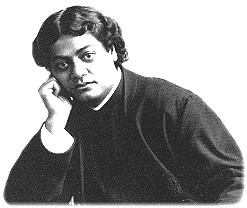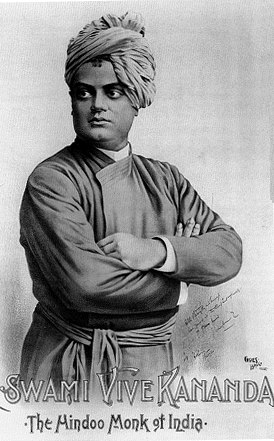I am delighted to announce this week’s guest blogger, Rajiv Chopra, who is introducing his first trailblazer nominee: Swami Vivekananda. Rajiv is a very talented writer and photographer who is writing about several Indian trailblazers to open our eyes to Indian culture, its history, and its people. A quick quiz: How many of you know that the number zero and the world’s numbering system originated in India? To learn more about Swami Vivekananda, read on.
Superstition is our great enemy, but bigotry is worse–Swami Vivekananda

Swami Vivekananda. Source: http://www.vedanta.com/store/vivekananda_bio.htm
I am part of a transition generation, where the wounds of the Partition run deep, as do the words of people like Swami Vivekananda.
In 1947, India got her Independence from the British, and was partitioned into India and Pakistan. Bangladesh was part of Pakistan, and was called East Pakistan. That same year, it gained its own freedom and became Bangladesh. But, that is another story. Simply stated, I grew up in a time of turmoil. It is in this context that many social reformers like Raja Rammohan Roy came up in India. Few, like Swami Vivekananda, however, had such impact and that too in such a short time.
Swami Vivekananda’s words on religion and tolerance are words that motivated me as a kid. I have a small book of his quotations in my bedside drawer. I believe that, if we take his learnings seriously, they can have a lasting impact on world peace. They can reverse the trend of what is happening in India. We are moving towards bigotry.
We are what our thoughts have made us; so take care of what you think. Words are secondary. Thoughts live; they travel far.–Swami Vivekananda
He was born in 1863, as Narendra Nath Datta, and died in 1902. He was one of those who contributed to the making of modern India. His father was a successful attorney, and his mother was a devout lady. His father’s interests ranged far and wide. Narendranath excelled in music, gymnastics and sports. He studied, and acquired a vast knowledge of many subjects, including Western philosophy.
As a young man, he doubted the existence of God. No one could give him a satisfactory answer as to the existence of God. However, in what was to be a landmark event in his life, he met the famous saint – Ramaskrishna – who said to him, “I see God as I see you, but in a deeper sense.” To see God, to see Divinity, you need to feel the presence, and go beyond superficialities.
His father died in 1884, and Ramakrishna died in 1886. He changed his name to Swami Vivekananda in 1890, about the time that the Indian National Congress was formed, and then toured India.
If money can help a man do good to others, it is of some value; but if not, it is simply as mass of evil, and the sooner it is got rid of, the better.–Swami Vivekananda
When he toured India, he was shocked by the poverty of the majority of Indians. He was shocked by their level of ignorance.
India is said to have housed one of the first universities in the world – the Nalanda University – which, was known in its time as a great centre of learning. However, due to reasons to complex to go into here, learning in India went into a decline. Learning was confined to kings and the Brahmins (the priests), and the rest of the population was allowed to wallow in superstition.
He realised that the people needed to be uplifted. He realised that you need secular teaching for economic benefit. He realised that you need spiritual teaching to restore faith.
Take up one idea. Make that idea your life; dream of it, every part of your body be filled with that idea, and just leave every other idea alone. This is the way to success, and this is the way that great spiritual giants are produced.–Swami Vivekananda
Swami Vivekananda founded the Ramaskrishna Mission on May 1, 1897. This is a spiritual organisation, based on the principles of the Ramakrishna Movement or the Vedanta Movement. Today it has branches across the world, and does extensive work in the areas of health, education, disaster relief, rural and tribal management and culture.
He travelled across India, he saw what needed to be done, and made that his life’s mission.
Comfort is no test of truth. Truth is often far from comfortable.–Swami Vivekananda
His fame and reputation were growing. In 1893, Swami Vivekananda was invited to speak at the Parliament of Religion in Chicago.

Swami Vivekananda. Poster The Parliament of Religion Conference, Chicago. Source: http://www.vedanta.com/store/vivekananda_bio.htm
Come, be men! Come out of your narrow holes and have a look abroad. See how Nations are on the march! Do you love your country? Then come, let us struggle for higher and better things; look not back, no, not even if you see the nearest and dearest cry. Look not back, but forward–Swami Vivekananda
I got that quote from a series of letters and writings to Sri Subramanya Iyer, which were published with the title of Plan of the Work for India.
The Gospel of Swami Vivekananda was published, much later, with a foreword by Aldous Huxley.
His words rang true then. They ring true today.
Why do I call him a trailblazer, and why do I bow my head in respect for him, even though 113 years separates his death from the year today?
He chose to act, and he chose to make a difference. He died when he was only 39 years old, and he was probably too young to die. Yet, the Mission that he set up lives on. It functions in a way that is consistent with the original principles, and continues to make a meaningful impact on the lives of thousands of Indians. He was not a rich man in rupees and dollars, yet he was rich in inspiration and true spiritual strength. Men, and women, like him are born too rarely, and this is our tragedy.
I am going to end with one last quote. One that our politicians of today should heed, at many levels, if India is to regain some of her old glory:
Let New India arise in her place. Let her arise….. out of the peasant’s cottages, grasping the plough…… and from the markets. Let her arise from the groves and forests, from the hills and mountains…..Swami Vivekananda
To read more about Swami Vivekananda, click on the links below:
- https://www.brainpickings.org/2014/07/15/swami-vivekananda-the-secret-of-work/
- http://www.vedanta.com/store/vivekananda_bio.htm
To learn more about Rajiv and his creative work, click on this link:
This is the sixth in a series of articles about forward thinkers who are helping to solve some of the world’s greatest challenges. These remarkable people are helping to define the future direction of their community, country, and even our global society. To read more about the Pilot Fish Trailblazer Awards and the nominees Dr. Fred Sanger, Paolo Soleri, Ruth Bader Ginsburg, Jane Goodall, and Alice Waters, click on the embedded links. Suggest new nominees in the comments section below.
Categories: Pilot Fish Trailblazer Awards
Wow. It looks good!
LikeLike
Thanks for sharing your thoughts here, Rajiv! You’ve highlighted a very wise man.
LikeLike
Reblogged this on Rajiv Chopra.
LikeLike
I enjoyed the read. Thank you for sharing an insight into Indian history/culture/religious practices. For the uninformed, could you explain what the title “Swami” means?
LikeLiked by 1 person
Hi Kirizar. I believe “swami” is a title given to a Hindu spiritual teacher. Let’s see what Rajiv has to add to that. I am so delighted you enjoyed the post! I really liked Rajiv’s idea of introducing some great Indian trailblazers to us all to open our eyes to the Indian culture.
LikeLike
I love everything that has to do with Indian culture and philosophy. Thanks so much for introducing me to this very fascinating philosopher.
LikeLiked by 1 person
Wonderful, Maria! Rajiv plans to write a few more posts about Indian trailblazers. So, there’s more to come!
LikeLike
Thanks for the introduction. Truly enjoyed learning about him. This quote rings loud and clear: “We are what our thoughts have made us; so take care of what you think. Words are secondary. Thoughts live; they travel far.”–Swami Vivekananda
LikeLiked by 1 person
Hi Sally. Yes, I should remember those words every day!
LikeLike
A great Motivator and a greater leader.
LikeLiked by 1 person
Hi Ashokbhatia. So glad to get your perspective on Swami Vivekananda. Do you know why he died so young?
LikeLike
I’m afraid that I learned little about Indian culture and history in school. I’m trying to rectify that now as an adult, and I’m glad to read about the Trailblazer Swami Vivekananda. “…rich in inspiration and true spiritual strength.” What a great line. I look forward to Rajiv’s future posts.
LikeLike
Hi Jackie. The same is true for me. What I have learned was on my own. Rajiv’s posts will introduce us to some great people. Have a wonderful holiday season!
LikeLike
i am afraid our school teaching has not taught me anything about this man. Now I know more of him – an important and wise man. One of the great mistakes in the school systems is the fact that they almost only mention western pioneers as important. As a grown person you must take the time to find out the rest on your own…
LikeLiked by 1 person
I have had the same experience. We learned so little about the Eastern cultures. It was so Western-centric.
LikeLiked by 1 person
Thanks so much the link! We appreciate that you’re spreading the word!
LikeLike